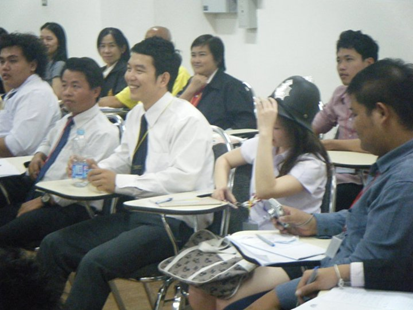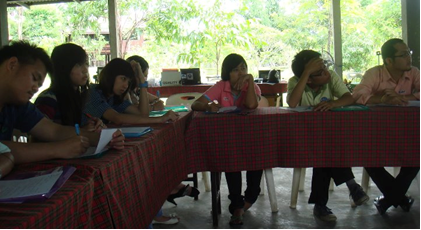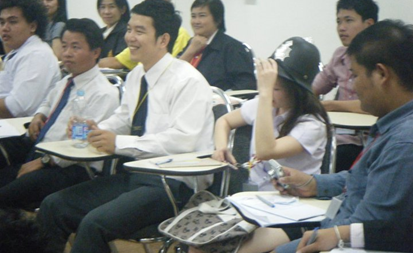 Training of Trainers in Thailand
Training of Trainers in Thailand
To keep up with the expansion of CLE programs in Thailand’s universities; BABSEACLE, together with CLE Foundation, initiated a needs assessment at the beginning of 2011 to gage the level of support on CLE methodology and program implementation needed by each university. BABSEACLE Directors Bruce Lasky and Wendy Morrish and BABSEACLE Foundation Director Don Wannarat visited CLE programs at Payap University, Mae Fah Luang University, University of Phayao, Chiang Rai Rajabhat University, Lam Pang Rajabhat University, Mahasarakham University, Northeastern University, Muban Chombueng Rajabhat University, Thammasat University, Ramkhamhaeng University, and Sripatum University.
This was followed up with a series of Training of Trainers workshops and CLE materials and resources. One of the most enthusiastic groups BABSEACLE and BABSEACLE Foundation met on their tour was at Muban Chombueng Rajabhat University (MCRU), about two hours outside Bangkok, where 90 students attended an “Introduction to CLE” workshop. Just two months later, we were back to help CLE Director Nashayagal Rattanavorragant open the university’s Community Legal Clinic! (see article “Teaching Law Students and Serving the Community”) It’s an in-house clinic and they also do community teaching. One of the communities they provide support for is a refugee camp on the Burmese border and MCRU law students have also been teaching and learning land law as it relates to the two provinces in which they are responsible for ensuring that development respects local traditional culture.
In April of 2011, BABSEACLE and BABSEACLE Foundation presented a five-day CLE Skills Workshop at the University of Phayao, with 62 participants from seven universities, two local non-governmental organizations and one local government representative. The participants included law professors, law students, developmental officers of government and non-governmental organizations and volunteers. It was during this five-day workshop that BABSEACLE had their first activity with the IDEA organization, which teaches debating skills.
Law professors from Mae Fah Luang University who had attended the CLE Skills Workshop at the University of Phayao subsequently asked BABSEACLE together with BABSEACLE Foundation to come to their university to do a workshop. This led to meetings with the Dean of the Law Faculty, Assoc. Prof. Dr. Apirat Petchsiri, to discuss ways of implementing a CLE course and developing curriculum at the university. Less than a year later, Mae Fah Luang University is ready to offer an accredited CLE course in 2012.
Chiang Mai University, the first CLE group in Thailand’s new CLE network, supported four workshops in 2011, focusing on clinic supervision and interviewing skills. Attending these workshops were their own students, BABSEACLE externship participants from Malaysia, Viet Nam, Laos and Australia, as well as visiting Laos law students and lecturers.
Each workshop directly built on the teaching of the previous training, with the last training held in conjunction with the Access to Justice fair and Trio for Justice event in November 2011.
Holding successful workshops has enabled universities from every area in Thailand to establish or strengthen their CLE program with the goal of having these CLE activities become an accredited course in their law faculties. These universities want to train the future lawyers of Thailand to work for social justice.
With such ambitious CLE goals, many of the Thai universities are anxious to have more training to support their activities. As many of these CLE programs are new, training is essential to make sure law professors, students and the community at large are all made aware of the CLE pedagogy, as well as the benefits and challenges of having an accredited CLE course included into a law faculty’s activities.
To accommodate the requests for more training, in 2012, BABSEACLE and BABSEACLE Foundation will facilitate placing inter-national clinicians with some of the partner universities, as well as offering two CLE legal fellowship positions for CLE graduates. These people will hold training workshops and work closely with the CLE programs to support and train on “best practices” and “lessons learned in establishing accredited CLE programs”.

